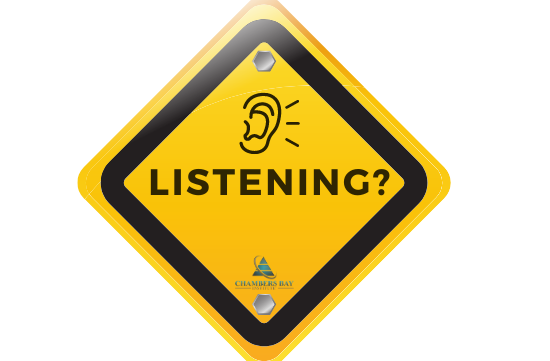by Jim Solomon and Bruce LaRue, Ph.D.
“Leaders who don’t listen to others will eventually be surrounded by people who have nothing to say.”
Craig Groeschel
Be Quiet and Listen
Even more than what you say, your ability to listen reflects on your skill as a leader. The best leaders listen to inspire trust in others and to learn. This can only begin by demonstrating that you not only hear, but most importantly that you understand what is being said.
Tom Koulopoulos, the author of 13 books and founder of the Delphi Group, a 25-year-old Boston-based think tank, explains that when listening, “Often, we don’t “get it” – and that’s OK, as long as we question after listening to get personal clarification and to show that we are trying to comprehend exactly what is being said.”
Questions are a demonstration of respect from the listener. Watch the reaction of the speaker when you inquire after listening. Often this simple act can break down barriers, create buy-in more rapidly, and begin a strong relationship.
W.A.I.T. “Why Am I Talking?”
David Emerald, author of The Power of TED* (*The Empowerment Dynamic), agrees that leaders must listen deeply and then ask insightful and helpful questions. The speaker should feel seen, heard, and appreciated. In this way, the leader serves as a coach, helping to clarify needs and desires.
David shares that leaders should remind themselves to “W.A.I.T.” (Why Am I Talking?) and to self-reflect asking oneself before jumping into a conversation:
- What is my intention behind what I am about to say?
- Is there a question I could ask that would help me better understand what the other person is saying and perceiving?
- How might I simply listen and let go of my urge to talk in this moment?
Make it a Habit
Lolly Daskal – author of The Leadership Gap – What Gets Between You And Your Greatness and legendary leadership coach, shares from the scores of leaders she has advised, that listening can be a leader’s most important skill. Just as with any skill we want to master, it needs to be practiced so that each element becomes a routine habit.
Lolly suggests that leaders who know how to listen practice these habits:
- Listen with full attention
- Listen to learn
- Listen to understand
- Listen without interrupting
- Listen to form connections
- Listen without needing to reply
- Listen to silence
Don’t Be the Smartest in the Room
For Kerry Larson, experienced senior executive with an extensive background in organizational transformation and executive coaching, he doesn’t care to be the “smartest person in the room”, but often was and continues to be the wisest.
He stresses that actively listening to the people at the operational level and incorporating their input into the strategy should always be a top priority. While Vice President at McCaw Cellular and later as Senior Vice President at AT&T Wireless, Kerry recalls: “We were not sure how best to market this new (cellular) technology in the various parts of the country and compete with different regional competitors, so we let these smart people (operational employees) figure it out in their part of the country and share with the rest of us what worked and what didn’t.” He encouraged his team to serve as his operational advisors so he could listen and learn from them.
Listen for What is Not Being Said
Be sure to closely listen for what is not being said. Are they missing critical details? Are they thinking too narrowly from their own functional perspective? Are they missing the big picture? Who else should be in the meeting that might be affected by the problem at hand?
Once everyone feels comfortable that you have listened fully and understood their ideas, it is time to think out loud with your team. The sooner you can demonstrate that you have listened to their ideas and put them in motion, the quicker you will build momentum. Imagine being the boss who truly listens to ideas from others and then acts on them.
Listening When Your Team is Remote
Vivian, a supervisor of a large information and communications team supporting a global logistics firm sent small teams to remote locations to provide geographically local support. At first, when the teams would deploy, communications between Vivian and the team were rare.
Through her leadership coaching experience, she realized that she was failing her remote teams by not communicating with them sufficiently. Neglecting to listen to her remote employees as well as she had to her local ones became an obvious gap in Vivian’s leadership.
She began to open the lines of communications with her teams with weekly telephone update meetings to listen to the team’s accomplishments, challenges, and needs. Then she added random calls to individual team members just to say hello and to provide an opportunity to listen to them as they were used to back in the office. Finally, she added virtual brown-bag lunch gatherings for employees at the headquarters with their remote colleagues so all could share and listen building on their bond as an organizational family.
Besides a rise in morale, team metrics rose, volunteers to serve with the remote teams increased, and top employees from other segments of the organization submitted requests for transfer to Vivian’s department. Listening was seen as a sign of respect and caring by the boss to the team. This simple but critical change in this leader’s behavior had a monumental impact on her team and ultimately their outcomes.
Listening Yet?
Are you surrounded by people who feel comfortable, are encouraged to share, and want to confide by speaking with you? Or are you surrounded by people who have nothing to say? If you are not sure how good a listener you are – ask for feedback, then listen well, take it to heart and learn from those who you want to listen to you.
Are you building a culture of trust by learning from listening? Have you created a habit of listening actively to build off the ideas you hear? Do you model how you listen, so your team listens to you?
By the way, thanks for “listening” to our article – your customers, organization, team, and others appreciate it! Just ask them!

www.chambersbayinstitute.com ● leadership@chambersbayinstitute.com

You must be logged in to post a comment.